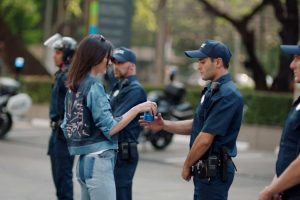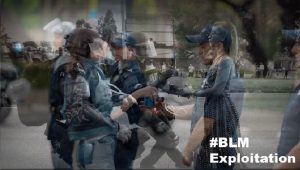
Analysis of the Original Ad: Addressing the “Problem”
Advertisements are everywhere in the form of commercials, posters, and billboards in our daily lives. Unfortunately, some advertisements reflect the social injustices of the world and propagate the stereotypes and standards that society imposes. One such ad is the Super Bowl Sunday commercial by Pepsi. In this commercial, Kendall Jenner joins a protest mimicking the Black Lives Matter (BLM) movement when she sees the happiness of the people participating. This undermines the whole concept behind why people protest: they gather together and march to express their views on social justice issues they want to change, not because they see protesters having fun. Throughout the commercial, the song “Lions” by Skip Marley plays, with lyrics such as “the movement” and “took all my rights away” as the video pans across the images of protesters on the streets. The use of this song clearly indicates the parallels that Pepsi wants viewers to draw on, as the generic movement in the video is meant to be the viral BLM movement, in which protesters campaign against violence and systemic racism towards black people. At the end of the commercial, white supermodel Kendall ends a standoff between the protesters and the police by going up to one and handing him a can of Pepsi, signalling the end of tensions as the crowd of protesters cheer. Pepsi tries to spread their absurd message that differences don’t matter when a can of Pepsi is involved: who needs hatred when you can drink carbonated sugar? This advertisement makes light of a serious matter where many protesters have died for their beliefs. The commercial echoes the situation where famed protester Ieshia Evans risked her life standing up to armed police in riot gear at a BLM protest in Baton Rouge. She was arrested and charged, whereas Kendall was rewarded with a smile from the police and applause. This Pepsi ad appropriates and exploits the BLM movement, where many protests end in violence, tear gas, and arrests. Pepsi’s sugar-coated version of protests in the real world highlights the double standards of racial and social privilege and inequality in the world.

Jammed Version of the Ad
The alterations aim to subvert the injurious social message of the ad, wherein the company Pepsi exploits the viral Black Lives Matter protest. First, I used the scene that Pepsi was clearly inspired by: the standoff between BLM protester Ieshia Evans and police in riot gear; I used a black and white image to convey the seriousness of the ugly reality of violence and arrests that protesters face. On the other hand, the Pepsi scene was kept in colour to show how the company is clearly promoting their own product while exploiting the BLM movement. I used an overlay of the two images to emphasize the huge discrepancies in the two situations, and how Pepsi modelled their ad and used the BLM protest to further their own profit agenda. In addition, it may be hard to clearly see the two images overlapping, but this effect is on purpose: to point out how many advertisements seek to blind consumers to reality and hope that their creation of a fantasy promise (such as one where a can of Pepsi can unite the world and end tensions between protesters and police) will convince consumers buy their products. However, if you squint and ponder more about the situation, you can see what is really going on behind the scenes: Kendall Jenner, a white supermodel is rewarded by a smile when she approaches a police officer with Pepsi, whereas in a complete 180 degree turn, Ieshia Evans was arrested and charged when she approached police officers during a BLM protest. The overlay of the two pictures highlights the stark contrast between the two situations and the black and white conveys the ugly reality of racial and social privilege and inequality, compared to the sugar-coated version that Pepsi promotes. In addition, I added the hashtag #BLM Exploitation to clarify to viewers what my jammed version of the ad is trying to reveal: the exploitation of a social justice movement for company profit, and the racial and social inequalities still prevalent in the world.